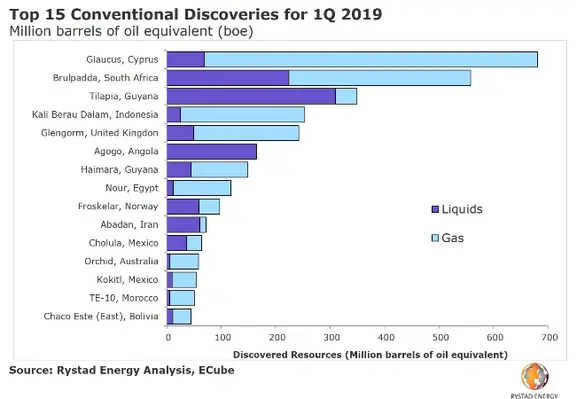Oil and gas exploration is off to a flying start in 2019, with majors taking a bigger role of the conventional resources discovered in the first quarter, according to Rystad Energy
Global discoveries of conventional resources in the first quarter reached a robust 3.2 bbo of oil equivalent. Most of the gains were recorded in February, posting 2.2 bbo of discovered resources.
“If the rest of 2019 continues at a similar pace, this year will be on track to exceed last year’s discovered resources by 30 per cent,” said Taiyab Zain Shariff, upstream analyst at Rystad Energy.
Majors are leading the charge in exploration, reporting more than 2.4 bbo of oil equivalent of discovered resources. The six largest discoveries by the majors each exceed 150 mmbbl of oil equivalent, and the top three could even hold more than 300 mmbbl of oil equivalent apiece.
ExxonMobil was the most successful, with three significant offshore discoveries accounting for a whopping 38 per cent of total discovered volumes. European majors Total and Eni are also in the fold with successful offshore wells in South Africa, the UK, Angola and Egypt.
Meanwhile, Repsol’s operated Kali Berau Dalam gas find in Indonesia takes the prize for the largest onshore discovery of the quarter.

From a global perspective, the push for substantial new discoveries shows no signs of slowing down, with another 35 high impact exploration wells expected to be drilled this year, both onshore and offshore.
Three such highly prospective wells are already underway:
· The Shell-operated Peroba well, off Brazil, with pre-drill prospective resource estimates of 5.3 bbo of oil equivalent
· Eni’s Kekra well in Pakistani waters, with pre-drill prospective resource estimates of 1.5 bbo of oil equivalent
· The Total-operated Etzil well off Mexico, with pre-drill prospective resource estimates of 2.7 bbo of oil equivalent
“If these wells prove successful, 2019’s interim discovered resources will be the largest since the downturn in 2014,” Shariff remarked.





